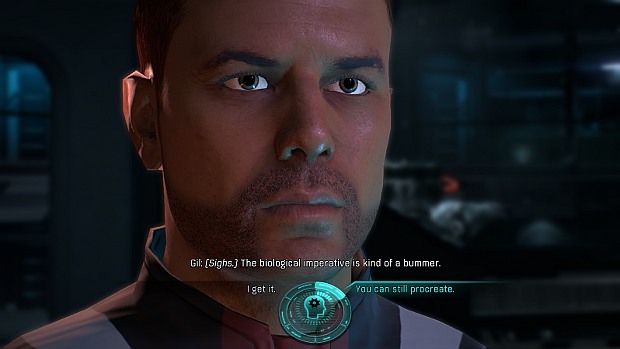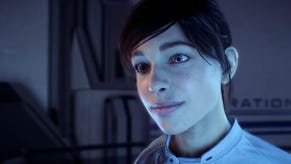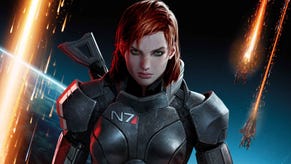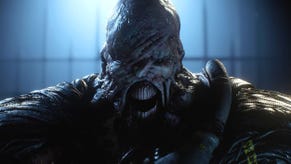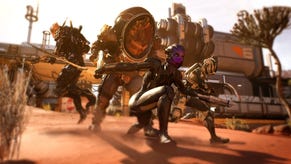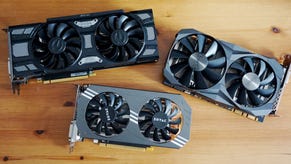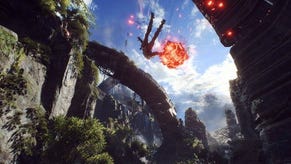Mass Effect Andromeda's romances are more elaborate and more forgettable
We review relationships
In Mass Effect’s twin galaxies of the Milky Way and Andromeda, there’s a lot of smooching to be done, along with awkward flirting, saucy trysts and deep romantic connections with pretty alien boys and girls. BioWare’s been tinkering with its sexiest system for years, even before Mass Effect let us play out our embarrassing Kirk fantasies. And with Andromeda, they’ve promised even more junk-to-junk shenanigans, as well as deeper relationships.
Have they delivered? And, more importantly, can anything beat hooking up with Dragon Age: Inquisition’s Iron Bull and his infinite pecs? I’ve become a space Lothario to find out.
The one promise that’s undoubtedly been fulfilled is the expanded choice of romantic partners. It’s a big ol’ sex buffet. There’s still room for improvement, however, especially when it comes to gay options. Chaps get the short end of the stick with only two potential same-sex partners, neither of whom can join your squad. There’s Gil Brodie, the Tempest’s engineer, who loves to talk about himself and sports a horrific pseudo-beard, and Reyes Vidal, a smuggler and undoubtedly the hotter of the pair, but he’s a pretty minor character.
Straight, bisexual and lesbian Ryders have a lot more options. An overwhelming number of them, in fact. I wasn’t in the Tempest for more than a few seconds before I was being given the choice to flirt with people I didn’t even know, and it’s worth noting that it’s possible to flirt with characters who ultimately aren’t interested in what’s in your pants. Every introductory chat barring two – Salarians and Krogan continue to get zero love – has the potential to turn into some creepy workplace sexual harassment.
It’s not a great start. I get it – BioWare want to make it clear there are lots and lots of people you can knock boots with, and none of the flirty dialogue choices are compulsory, but it just comes across as very awkward. Every single one of them ends up hovering between chatting up your first high school crush and being a sleazy boss. What it also does, however, is establish that romance isn’t some end-game reward. It can start very early on, and the climax of that relationship isn’t forced into a fixed point near the end of the game.
Characters are looking for different things, and they might change their mind about what those things are. Some are super flirty and don’t take much convincing if you’re looking for zero-G fun, while other relationships are slow burners, starting off as friendships before flourishing into something more romantic. It’s a significant change from the one-size fits all approach in the original trilogy, particularly the first game, where the majority of relationships evolved in the same way, at the same pace.
Andromeda recognises that committed monogamy isn’t the be all and end all of relationship statuses, too. A casual fling with Jack in Mass Effect 2 is clearly a dick move, but this time it’s healthy, just another point on the romantic spectrum. There are some characters, like Avela the historian, who are only interested in a carefree hook up, others who are interested in both types, and a few who only want something serious. The system, then, is by far the most elaborate of any BioWare RPG, but it’s still this overtly mechanical thing.
The seams are so terribly obvious, and it quickly becomes clear that a lot of the aforementioned nuance is only surface deep. It’s all about perseverance and feels uncomfortably transactional, almost predatory at times. It largely boils down to doing a heck of a lot of flirting after missions and doing a spot of busywork for your chosen paramour. This isn’t remotely exclusive to Andromeda, of course, but it’s much harder to forgive this time around because Andromeda lacks the integral ingredient that makes the relationships in the first trilogy or the Dragon Age series so compelling: intriguing characters.
Cora, who seems positioned to be the main romantic partner, has less personality than her haircut. She might not be the least likeable member of the Tempest crew, but she’s definitely in the running for the most bland. It’s a hotly contested position, mind you. The script is just a nightmare, transforming conversations into long-winded info dumps peppered with robotic banter. Breezy chats, theological debates – they’re all handled with an impressive lack of sophistication. The crew don’t feel like people; they don’t even feel like archetypes.
Nobody really talks like a person in Andromeda. Their preferred method of communication is spewing out clichés, and listening to them is akin to being forced to sit through the audio tape of the world’s most dismal autobiography. There’s so much of this inane dialogue that, I confess, I often found myself browsing my Twitter feed or talking to my dog instead of listening. My ears can only take so much abuse. The introductory chat with Gil really encapsulates everything that’s wrong with Andromeda’s script.
Ryder: “What’s your social circle like?”
Gil: “I’m good for a laugh, so I know lots of people – but I don’t let too many in.”
He’s a total liar, because you honestly can’t get Gil to shut up about whatever is running through his mind. He’s more than an open book, he’s every page of a book stuck on a wall for all to see. And, as I’ve already mentioned, he has a really stupid beard. Don’t date Gil.
The truly weird thing about the dialogue is that, despite there being more of it than you can possibly digest, when it comes to romance, it’s all incredibly rushed. If you flirt a couple of times, spouting off some cheeky lines, you’re essentially courting. Cora seemed to think we had a “special relationship” after this superb example of barely flirting:
Cora: “I was there for soldiering, not romance.”
Ryder: “You’re not technically military anymore.”
Cora: “Can’t get anything past you, can I?”
Not long after this exchange, I was informed, by Cora, that we were close. Thanks Cora! That’s nothing compared to the pace of seducing Peebee, the gregarious Asari archaeologist/treasure hunter/nuisance. It amounts to two characters basically just shouting “FLIRTING” at each other until they make out. You literally flirt with Peebee by talking about flirting with Peebee.
So while Andromeda might have the best system for finding love among the stars, it actually ends up with absolutely the worst romances. It’s rather telling that the most convincing relationship in the series is the one that’s least like the others, between Shepard and Liara in Mass Effect 2. It works so well because Liara is able to define herself. She’s got her own mission, a job, friends – a life that no longer orbits someone else. She has a level of agency that no other character gets in Mass Effect. It’s a brilliant inversion of the game’s focus on recruiting a team for a suicide mission, as Liara recruits Shepard for her very own risky endeavour. And there’s none of the awkward seduction or perfunctory systems that typify the series’ romantic entanglements.
In my first playthrough of Mass Effect 2, I was compelled to stay faithful to Liara because I was utterly invested in this fictional relationship between a spacefaring zombie and a blue alien. It was a romance rich in character development, emotional growth, and importantly it felt like a relationship between two equals. But Ryder, inexplicably, has no equals. People fall in love with Ryder because Ryder is the Pathfinder and the most important person in the galaxy.
Andromeda’s treatment of romance suffers in the same way as the rest of the game. It’s larger and more ambitious, but it’s devoid of personality and crippled by an amateurish script. It shows that it’s not enough to simply expand the number of potential partners or acknowledge more than one type of relationship – they need to be supported by quality writing. And let’s not beat around the bush here: this is some of BioWare’s poorest writing. In this new galaxy, celibacy is pretty damn tempting.


